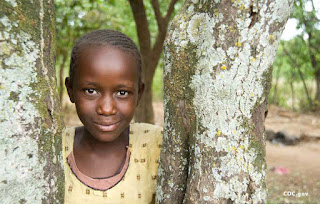 |
| A community health worker examines a child |
Terrified and sad by the test report, Mrs. Oloye was, at the same time relieved that she had found an explanation for her niece’s worsening health condition. Prior to the diagnosis Bunmi was sickly and sluggish and the aunt a local herb (Agbo) seller was at her wits end over the child’s steady health decline.
Bunmi was placed on antiretroviral (HIV) treatment immediately and the treatment has been beneficial. “Since Bunmi started treatment, she has become agile and well. She attends clinic monthly and we diligently give her the HIV treatment drugs every morning”, Oloye commented.
 |
| A girl leans against a tree in the village of Usoma — CDC photo |
Bunmi is one of the 600,000 men, women, and children currently on HIV treatment in Nigeria, with support of the U.S. President’s Emergency Plan for AIDS Relief (PEPFAR) working through USAID, Centers for Disease Control and Prevention (CDC), the Walter Reed Program as well numerous Implementing Partners.
For Bunmi and her adoptive family, it has been relatively easy adhering to the strict HIV treatment regime, and they have not suffered any HIV-associated stigma or discrimination. Attesting to this Oloye says: “the whole family is aware of Bunmi’s HIV+ status and they are very supportive. Bunmi is taken to hospital appointments by her cousins”.
medium


No comments:
Post a Comment